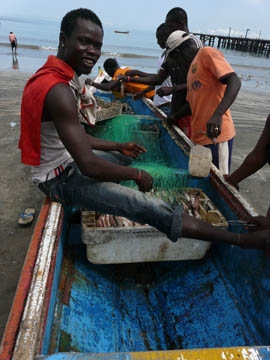Artisanal fishers are the voice of sustainable livelihoods for Africa
BANJUL – Today artisanal fisher groups from across Africa, including OCEAN2012 members, met in Banjul to send a strong signal to African fisheries ministers that artisanal fishing is the engine of economically, socially and environmentally sustainable fisheries. The fishers are meeting with civil society actors during the first ever conference of African Ministers of Fisheries and Aquaculture.
“This meeting demonstrates how artisanal fishers, communities and NGOs are able to work together, emphasising the need for involvement in decision-making. Involvement is the first condition to ensuring sustainable fisheries policies,” said Gaoussou Gueye, Secretary General of the Confederation of African Artisanal Fishermen Organisations (CAAFO), member of Ocean2012.
“It is vital that African artisanal fisheries stakeholders are involved in the decision-making that affects them and their communities, this includes the implementation of the New Partnership for Africa Development Action Plan,” Gueye added.

The potential of artisanal fisheries compared with the industrial scale fleet for delivering sustainability in Africa is clear. They:
- Employ over 12million fishers as opposed to half a million;
- Consume 1-3 million tonnes of fuel as opposed to 14-19million tonnes; and
- Catch 24million tonnes as opposed to 29million tonnes.
It is vital that African artisanal fisheries stakeholders are involved in the decision-making that affects them and their communities. Gaoussou Gueye, Secretary General of the Confederation of African Artisanal Fishermen Organisations (CAAFO), member of Ocean2012. Henry Ford
“There is a scarcity of fish due to overfishing and illegal fishing. This makes the need for accurate assessment of stocks and fair access to fish resources even more important. Artisanal fishers have an interest in ensuring catch limits are set at sustainable levels. Their knowledge of the marine environment needs to be integrated in the resource advice along with scientific research in order to deliver the most robust assessments of the health of fish stocks.” said Thomas Spencer, of the Sierra Leone Artisanal Fisheries Union.
- Employ over 12million fishers as opposed to half a million;
- Consume 1-3 million tonnes of fuel as opposed to 14-19million tonnes; and
- Catch 24million tonnes as opposed to 29million tonnes.
Notes to the editor
- The first Conference of African Ministers of Fisheries and Aquaculture meeting
- For more information about CAAFO/CAOPA: contact [email protected]
- About OCEAN2012
OCEAN2012 proposal for a reformed EU Common Fisheries Policy (CFP)
OCEAN2012 is an alliance of 90 organisations dedicated to transforming European Fisheries Policy to stop overfishing, end destructive fishing practices and deliver fair and equitable use of healthy fish stocks.
OCEAN2012 was initiated, and is co-ordinated, by the Pew Environment Group, the conservation arm of The Pew Charitable Trusts, a non-governmental organisation working to end overfishing in the world´s oceans.
The steering group of OCEAN2012 is the Coalition for Fair Fisheries Arrangements (CFFA), Ecologistas en Acción, the Fisheries Secretariat (FISH), nef (new economics foundation), the Pew Environment Group and Seas At Risk (SAR).






